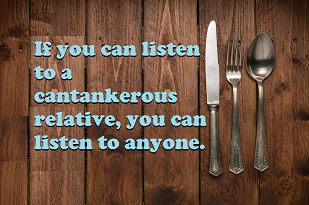This post is part of our Weekly Tips series.

It’s that time of year again. There’s a good chance you have holiday or year-end celebrations ahead, and a high probability you’re negatively anticipating—maybe even dreading—being with a family member or two. A politically-charged climate only makes this 10 times harder.
Your most difficult relative, in particular, can be really hard to hang out with. He or she can also be your best teacher, I’m sorry to say. Because if you can listen to Auntie Esther, you can listen to anyone. And listening is a hallmark skill that distinguishes advisors from trusted advisors and mediocre sales people from extraordinary sales professionals.
Of course, there’s a time to listen and a time to take a stand. That’s true for relatives and clients alike. Sometimes it works best in exactly that order: listen, then take a stand. Sometimes the stand should come first. Either way, a lot of listening usually helps, even though it’s the exact opposite of what our baser instincts tell us to do with the people in our lives who drive us nuts.
[Tweet “If you can listen to your most difficult relative, yeah the one who really irks you, then you can listen to anyone. https://thegetrealproject.com/?p=4676 #getreal”]
Most of us are mediocre listeners, at best, because the kind of listening that engenders trust—deep trust—requires intention and effort. First and foremost, we have to manage our own reactions when we’re triggered. Then we have to tune in in a way that our everyday business lives simply don’t support. (Case in point: There’s a good chance one of your electronic devices has pinged you since you started reading this tip.)
The good news: The solution to the listening problem doesn’t require surgery or a major personality overhaul. It’s available to you during any and every waking hour, and there’s no better time for it than during quality time with the cantankerous relative who has the ability like no other to wind you up like a tightly-coiled spring. The solution is, simply, practice.
Here are some phrases that might help you stay in listening mode:
- “Wow, we see that really Tell me more about your take on that.”
- “Interesting! What do you see, from your vantage point?”
- “This is clearly important to you. What’s your biggest concern about it?”
- “Seems like you’ve thought a lot about this. What led you to your point of view?”
- “Hmmmm … what’s behind that?”
With practice, you learn to overcome your biggest listening barriers. And that’s not just an investment in Auntie Esther; it’s an investment in you.
Make It Real
This week, unleash your natural curiosity on the people with whom you interact—family, friends, service providers—especially when they say or do something that really irks you. What techniques work to help you manage your own reactivity? What helps you really tune in?
Learn More

Refresh on what Everyday Empathy sounds like, or recall why you listening to them is the best way to get them to listen to you in Chapter 3 of The Trusted Advisor Fieldbook.
Andrea Howe
Latest posts by Andrea Howe (see all)
- Why choosing silence in the face of awkwardness can be a trust tragedy - March 21, 2024
- What NOT to do when you think you’re being ghosted - February 21, 2024
- Reprise: If you’ve resolved to have better client relationships this year, great, now ditch your resolution - January 2, 2024
